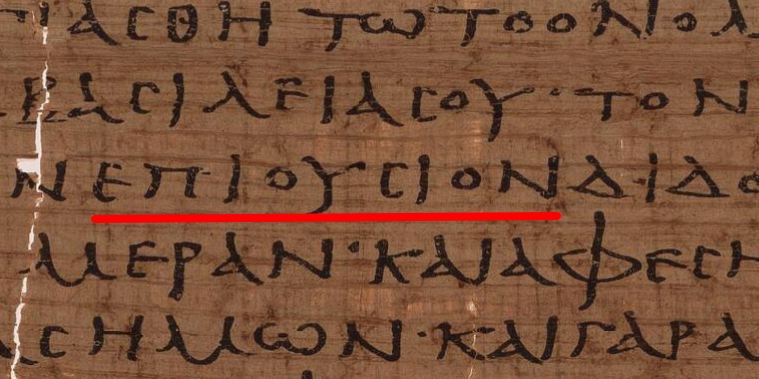the full line being “Give us today our epiousion bread”
Today, most scholars reject the translation of epiousion as meaning daily. The word daily only has a weak connection to any proposed etymologies for epiousion. Moreover, all other instances of “daily” in the English New Testament translate hemera (ἡμέρα, “day”), which does not appear in this usage.[1][2] Because there are several other Greek words based on hemera that mean daily, no reason is apparent to use such an obscure word as epiousion.[4] The daily translation also makes the term redundant, with “this day” already making clear the bread is for the current day.[21]
i don’t think wikipedia mentions this but it has ‘pious’ in the middle
I’m fluently bilingual in English and Spanish, and I grew up going to a Spanish speaking Presbyterian church. The kids in my high school taught me that “pan” (the spanish word for “bread”) was slang for “pussy”, so everytime my grandpa (the pastor) recited the Lord’s prayer, I always had a huge smile on my face thinking about him asking God to give us our daily allowance of pussy.
That’s hilarious. It makes sense for pan just to be a shortened ‘panocha’.
That’s the kind of wholesome content I’m here for
Greek guy here.
Επιούσιος (e-pi-u-si-os) is a composite word (you can make an astronomical number of composite words in Greek if you want to express a new concept, such as tele-phone) and in this sentence it means that which will nourish us for the day. So daily is quite fitting here.
So it’s more like “our day’s worth of bread” than “the bread we eat every day”?
Now it occurs in a post on lemmy
And so shall it echo across the fediverse, amen
I can’t argue the classical Greek etymology, but the argument about redundancy flies in the face how I was taught the Lord’s prayer. “Give us this day our daily bread” ~= “Give us our bread today as you do every day”.
I always took it as sort of like the amount of bread you need every day being “daily bread” and getting it every day.
Even as a kid I always just thought it was a metaphor. It’s not like god is out here giving people literal bread everyday so I figured it was code for “stuff you need to be okay” whether that’s bread or the courage to face the day.
I think it means “cromulent”.

These people need to embiggen their vocabulary!
I have only this moment realised that the prayer is referencing the xtian communion giving of bread symbolism, and not just randomly demanding food as if the writer was hungry
Scribes generally do a good job of checking that they didn’t make an error in transcription . It like likely that what we have is what was written down around ad40-ad90. (Years approximate). Things were written mostly by eyewitness or those who interviewed eye witnesses. The whole reads like it.
Of course things were translated to Greek, it is unlikely that the words were spoken in that language.
Things were written mostly by eyewitness or those who interviewed eye witnesses.
The scholarly consensus is that this is not the case. The earliest written Gospel (Mark) couldn’t have been written any earlier than the occupation of the Temple during the First Jewish Revolt in 66-67, and all indications are that he was writing down traditions that came from his community and others, with no immediate connection to any “eyewitnesses.”
(Source: I have a PhD in this stuff.)
PhD in what? Tell me about your opinion on the secret gospel. Not a trap. Just love this shit.
Literally every statement in your comment is false. Read a fucking book that isn’t the bible.
Flavius Josephus?
The daily translation also makes the term redundant, with “this day” already making clear the bread is for the current day
Yes, but it doesn’t make it clear that it is something you receive every day. If I say “give us our pizza today” it doesn’t imply that I have a daily pizza party (I don’t, just a silly example).
It actually makes the “this day” part redundant. Give us our daily bread works fine. I feel like the addition makes it seem like a demand or that it might not come.






